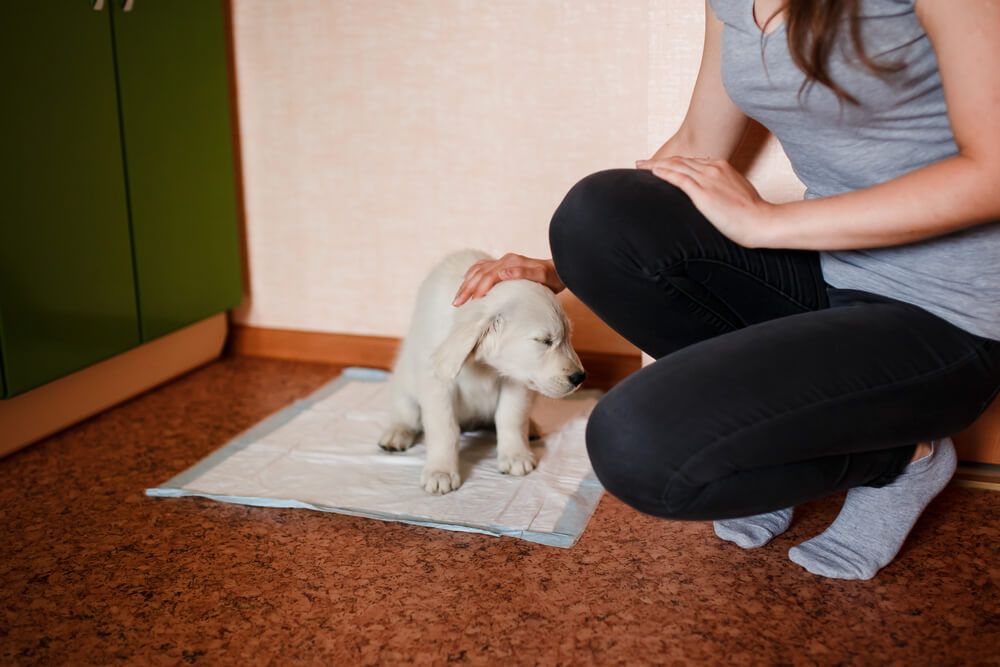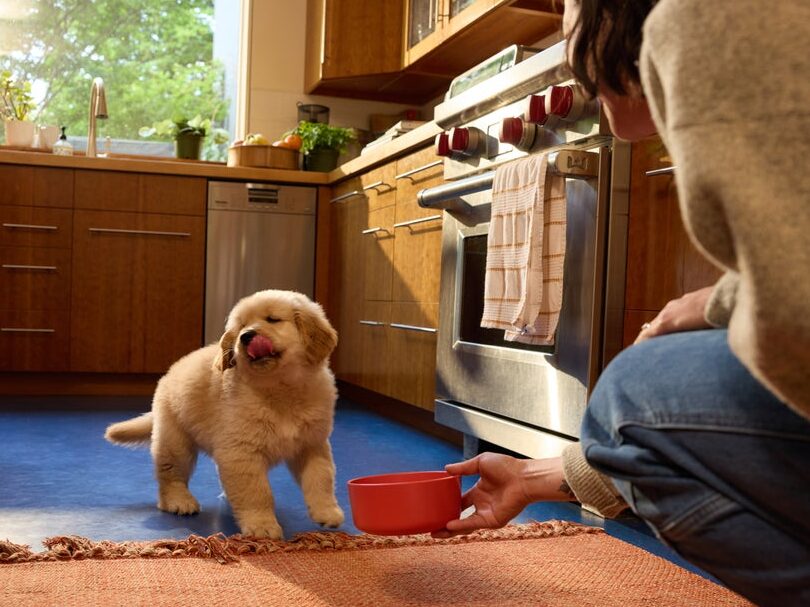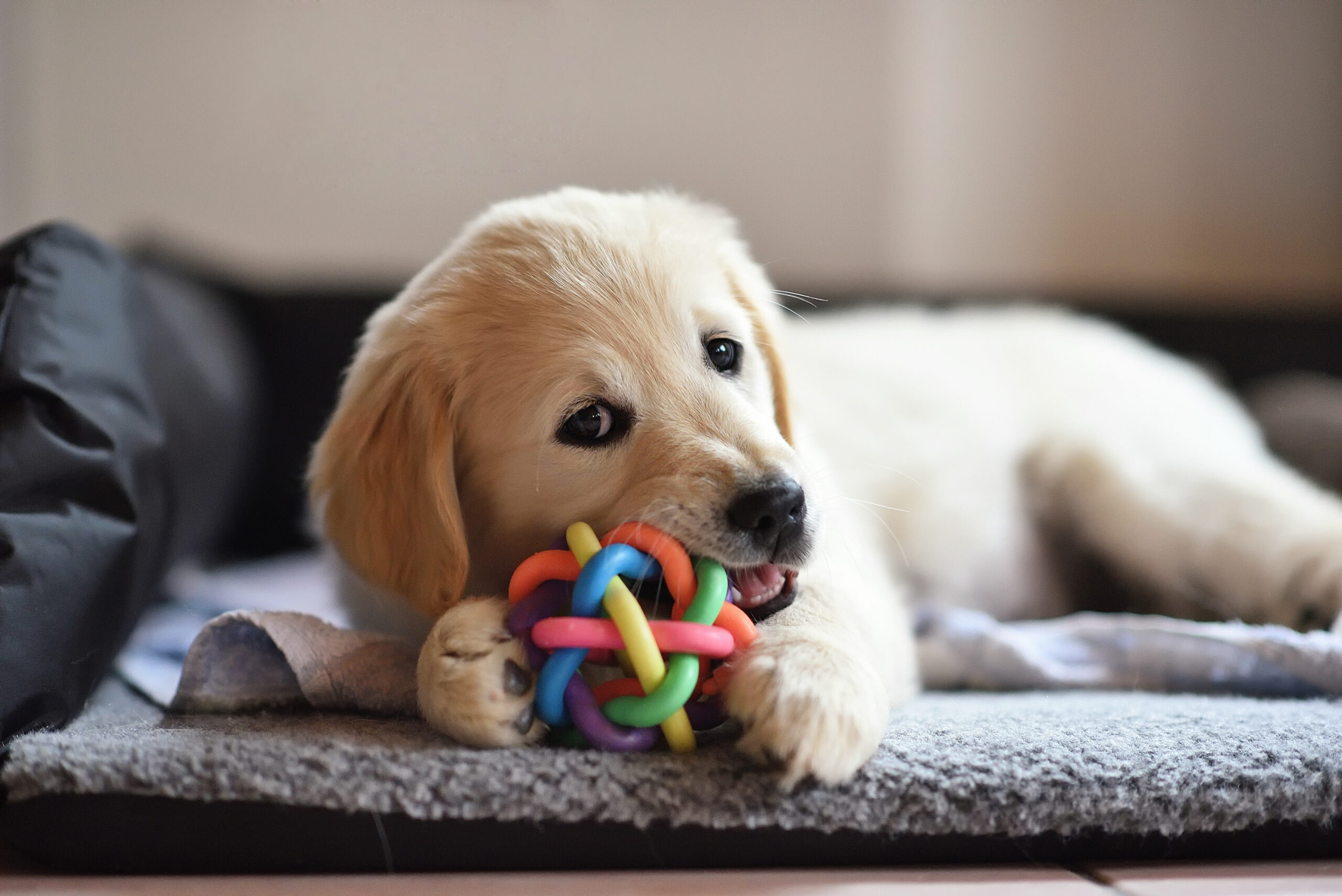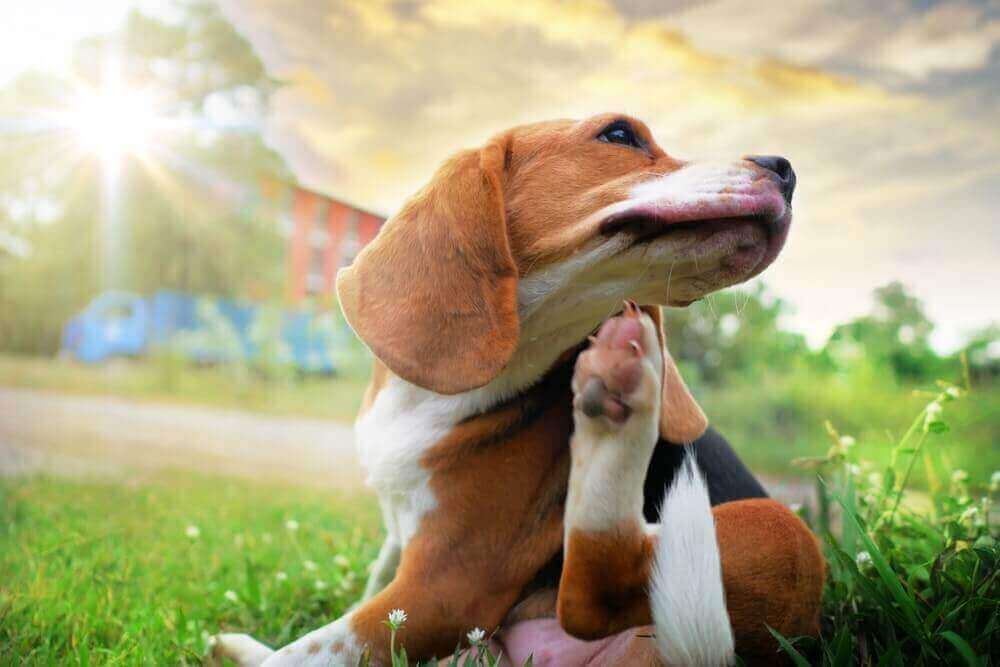Hey Ollie blog readers! We’re offering you an exclusive 60% OFF your starter box! Try now!
What’s one of the most challenging parts of raising a puppy? For many owners, it’s potty training (house training).
Those who have had multiple dogs know that the potty training process doesn’t necessarily get easier, you just become more patient and learn from your previous mistakes.
While no one can guarantee that your home will be mess-free and peaceful during this process, this proven potty training outline can accelerate training, decrease accidents, and help you keep your sanity. Here are our expert tips on how to potty train a puppy.
How long does it take to potty train a puppy?
Unfortunately, there’s no one-size-fits-all answer about how long it takes to potty train a puppy. Most resources suggest that the average training period lasts between 4–6 months, although some can take more or less time. Your puppy’s potty training will be influenced by many factors such as:
- Previous living conditions — Puppies who previously relieved themselves in a crate, pen, or kennel will need to learn new habits.
- Age — Bladder muscles don’t fully develop until 4-6 months of age, so younger puppies need more frequent breaks. Generally, puppies can hold it for one hour per month of age, up to 12 months.
- Schedule — A predictable schedule is crucial. Forgetting your puppy’s potty breaks or letting playtime go too long can cause accidents.
- Environment — Letting your puppy have too much freedom indoors can delay training due to lack of supervision.
- Training methods — Positive reinforcement and crate training speed up learning, while punishment can delay progress and harm trust.
- Consistency — Consistency in efforts, actions, and responses is key to successful potty training.
When should you begin house training a puppy?
Start house training your puppy as soon as you bring them home! This will set your new puppy up for success and minimize accidents.
How to Stop Puppy Biting & Mouthing
Potty Training Do’s and Don’ts
Use a crate
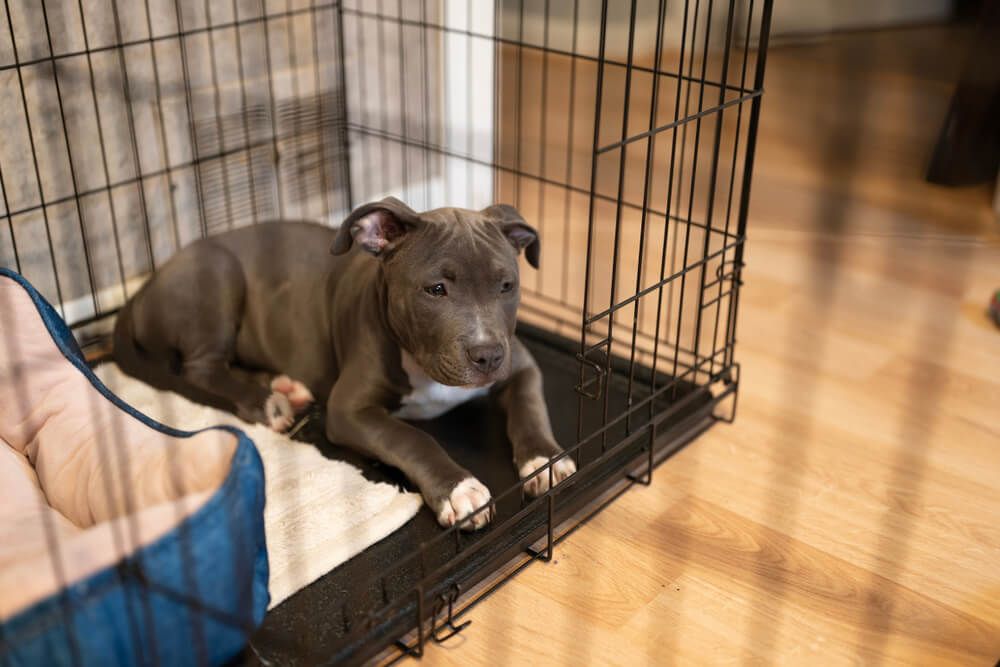
As the American Kennel Club points out, the crate creates a clear distinction between inside and out, which is an important early concept for puppies. Because the crate becomes equated with personal space, your puppy shouldn’t want to make a mess.
In the early days of your puppy’s life with you, they’ll need to sleep often and the crate is a safe and comfortable place to rest. If your puppy begins to whine or stir, they probably need a bathroom break, so be ready to take them out. As soon as you open the door to the crate take them directly to their potty area. If you use puppy pads to designate indoor spots for your puppy to relieve themselves, be aware that this may cause confusion if you later decide to train them to go potty outside.
When potty training a puppy, it’s also crucial to associate certain activities with bathroom time since this helps sync their developing systems with daily habits. For instance, always bring your puppy outside first thing in the morning when they wake up, and make sure it’s the last thing they do before saying goodnight. After a long indoor play session, take them outside to ensure they are empty, comfortable, and ready to rest in their crate.
Raising a Puppy: The Ultimate Guide
Finally, don’t miss the opportunity to associate eating and drinking with bathroom time, even if they just take a short break at the water bowl. Your puppy’s digestive system moves quickly, with a quick turnaround time. Remember, it’s always better to plan ahead and prevent an accident than deal with potential emergencies.
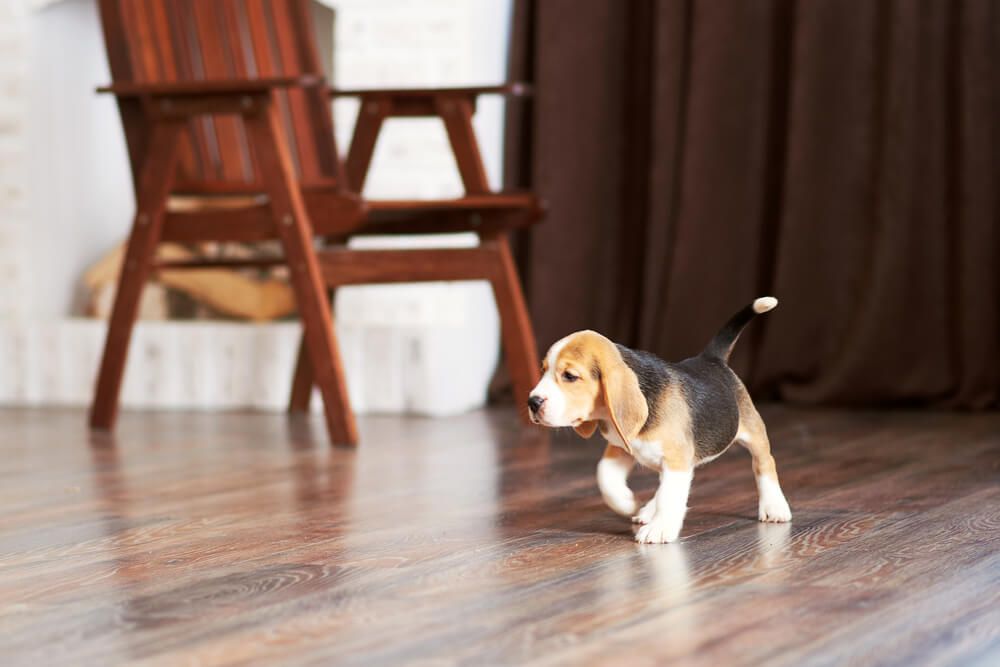
Let your pup explore gradually
Once your pup understands when and where to relieve themselves, begin giving them more freedom indoors but maintain close supervision at all times. Observe your puppy for signs they need to go outside, such as pacing, sniffing, waddling, or whimpering. If anything seems unusual, take them outside to the proper area. Praise and reward good behavior, especially if your dog alerts you to go out by barking, going to the door, or ringing a bell. Effective communication between you and your puppy is key to successful potty training.
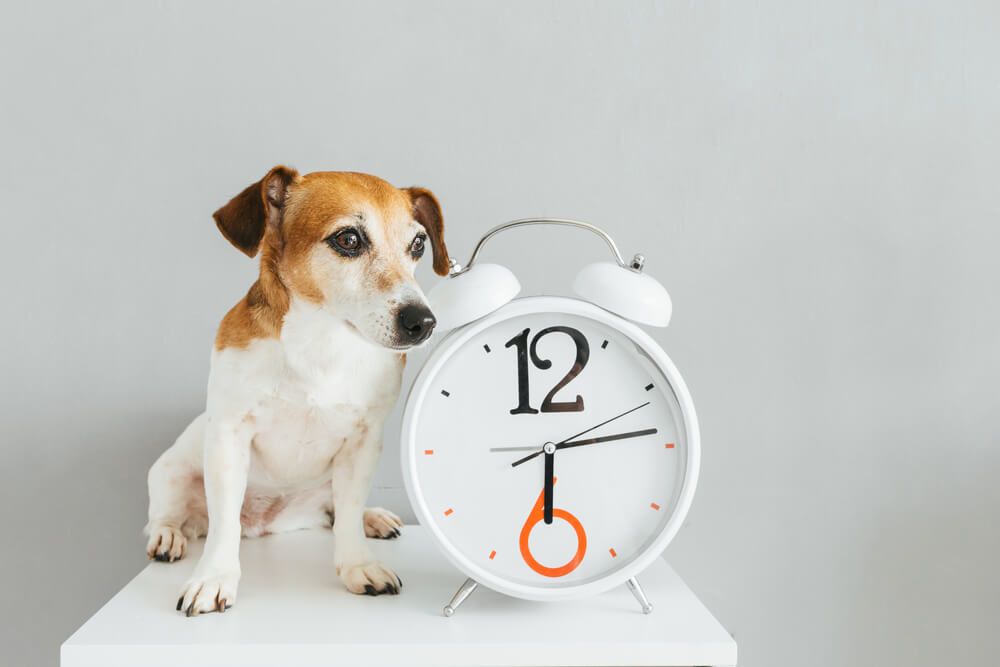
Stay consistent with house training
If family members will be involved in your puppy’s training or you need to leave your puppy in someone else’s care, explain the potty training schedule from top to bottom. This is doubly true when introducing a puppy to a new environment, such as a pet sitter’s home.
Be clear about your training style, what skills you’re working on, and any warning behaviors your puppy displays before they relieve themselves. Ideally, you’ll be able to pick up right where you left off when you get home or resume your puppy’s training.
Accidents happen (and it’s OK)
When learning how to potty train a puppy, know that even if you do everything right, accidents will happen! Fortunately, as long as you properly clean the mess, the occasional accident won’t hurt your puppy’s progress. Deodorizing the accident area is key to preventing repeat accidents, as the lingering odor can invite your puppy to relieve themselves in the same area again. Use a product like Nature’s Miracle that contains odor-destroying enzymes to eliminate urine odor.
Also, keep an eye on your puppy’s poop, especially during these early days of house training. Unusual poop, including frequent or loose stool and diarrhea, should be noted. Changes in your puppy’s output can indicate intestinal parasites or the need for a diet change.
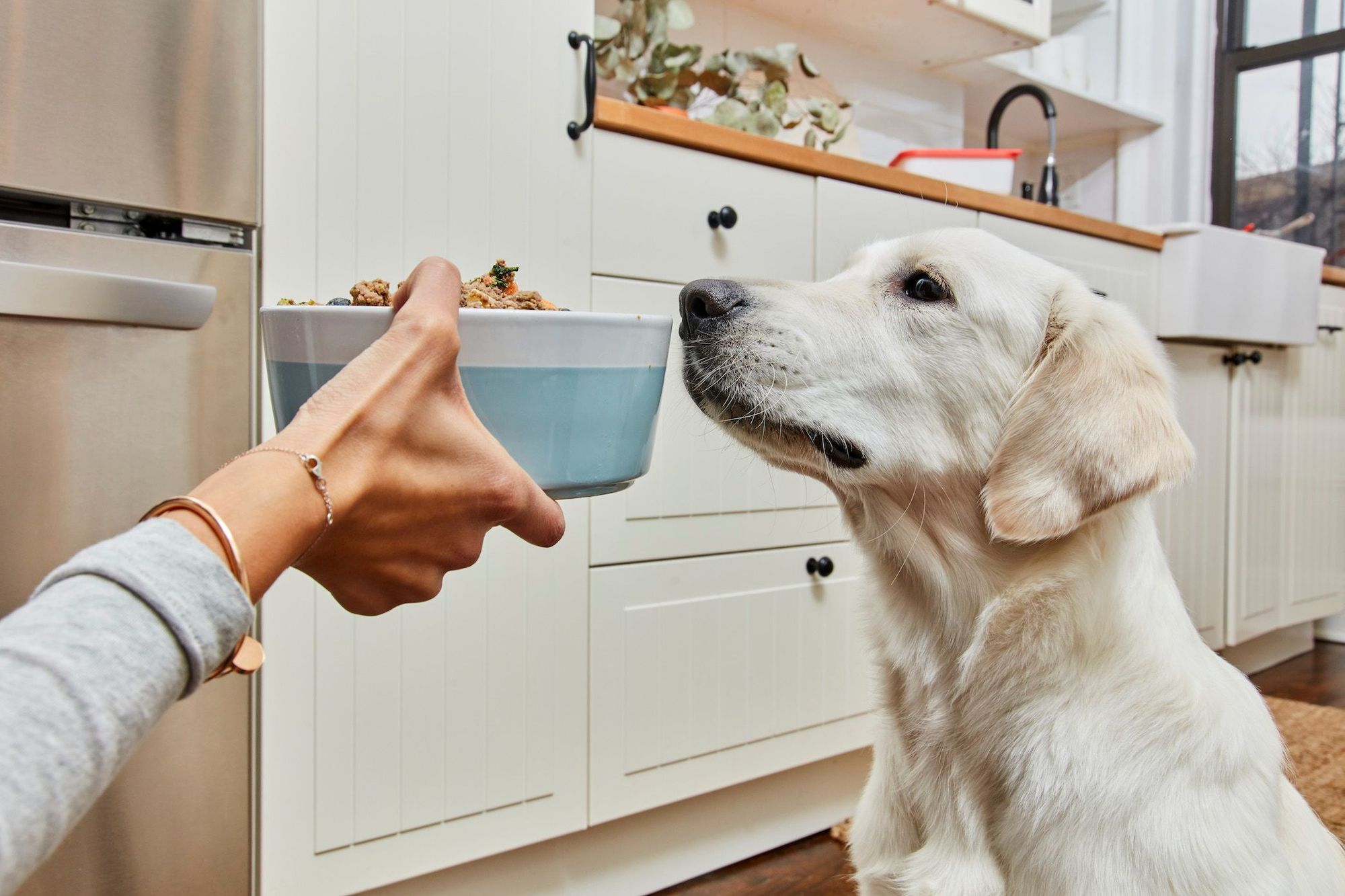
Mind their mealtime
Take your dog outside after every meal to create a positive association between mealtime and bathroom breaks. This pattern ensures more efficient potty training by making your puppy’s needs more predictable. Remember, your puppy’s internal clock is still being developed, so try to keep mealtimes locked into the same general time slot each day—even when you’re tempted to sleep in on the weekends.
Your puppy’s food is also critical for regulating his or her digestive system, helping them develop properly, and creating predictability during potty training. Additionally, the healthier and more nutrient-packed your puppy’s meals, the more likely they will have a quick and easy experience when they do their business.
Since we know the ins (and outs) of puppy training, we strive to remove all worries about your pup’s diet with Ollie. Not only do we use carefully selected human-grade ingredients in our food, but we also make each batch fresh so that you never have to wonder if you’re making the right call. The fresh food recipes from our kitchen are delicious for even the pickiest pups, and we have tons of different varieties for them to try. No more hesitation at dinner time! Our delivery system also ensures that you stick to a consistent feeding schedule, which plays into the potty training picture.
Don’t punish an accident
Accidents happen because puppy owners get distracted or puppies get too excited, stressed about their first bath, or nervous about a new person. Whatever the reason, it’s important not to punish your pup.
Clean up the accident, take your pup outside, and tell yourself you’ll pay better attention to your puppy’s needs.
Yelling, smacking, or rubbing your pup’s nose in their mess will do much more damage in the long run. Punishing your puppy can make them nervous or fearful about relieving themselves, causing them to hide when they have to go, which can lead to more accidents as well as bladder issues.
The Ultimate Guide to De-Stressing Your Dog
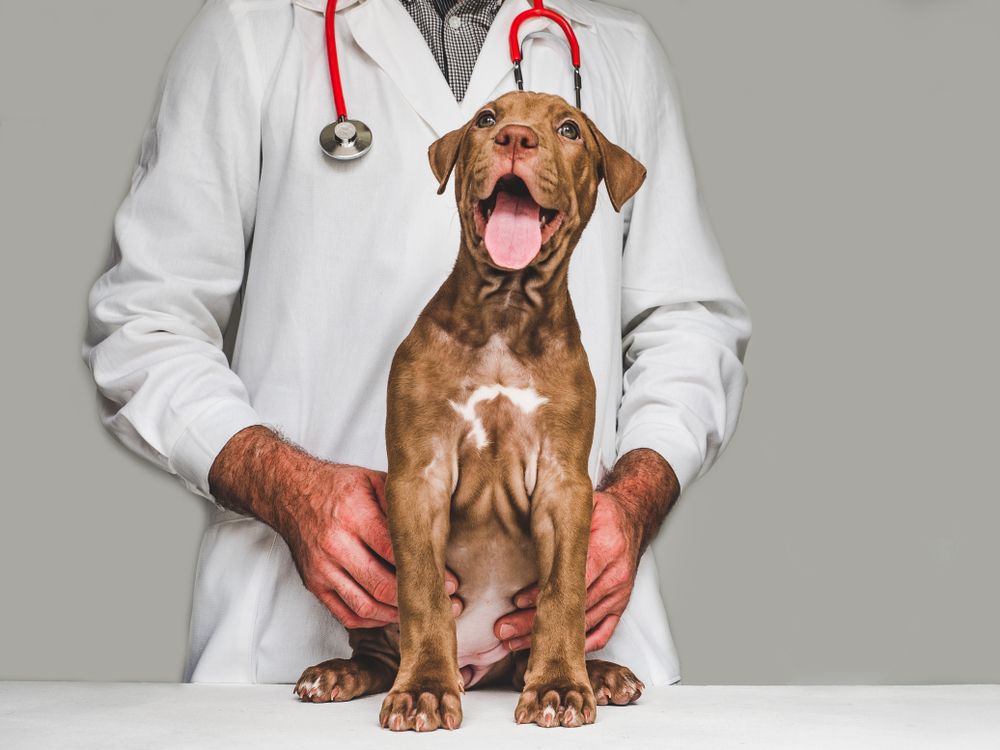
When in doubt, talk to the pros
If you’re having frequent setbacks or your pup is having accidents despite training, call your veterinarian. Health issues can impact your puppy’s success and should be addressed first before continuing training.
If your puppy receives a clean bill of health or is still having accidents despite medical treatment, consider contacting a certified trainer. Select a trainer who uses positive reinforcement and fear-free methods and has experience with puppies. These trainers have seen and heard it all and can help you and your puppy figure things out together.
Troubleshooting common potty training issues
Your puppy’s progress may not be linear, but that doesn’t mean you won’t succeed. Here are some answers to common potty training problems.
- My puppy is having accidents in the spare room — This can happen when puppies have too much freedom or have been punished and feel like they should hide when they need to relieve themselves. Keep your puppy in a small area and under close supervision at all times. Confine your puppy to their crate when you cannot supervise them.
- I can’t tell when my puppy needs to go — First, don’t always wait for signals. Take your puppy outside after they wake up, eat, or play and periodically during times of activity. Next, set up a nanny cam or use your phone to video your puppy so you can notice subtle signs.
- My puppy has accidents in their crate — Visit the vet to ensure your puppy doesn’t have a health issue. Thoroughly clean your puppy’s crate and bedding with an enzymatic cleaner to remove old odors. Ensure your puppy’s crate isn’t too big. Take your puppy outside more often and review your daily schedule to ensure they have a consistent routine.
- My puppy has accidents in the same area — There may be residual odor on your carpet or flooring. Ensure you are using an enzyme-based cleaner and thoroughly treat the area. Observe other household pets to ensure they aren’t having accidents in the area, making it appealing to your puppy.
The Ollie blog is devoted to helping pet parents lead healthier lives with their pups. If you want to learn more about our fresh, human-grade food, check out MyOllie.com.
Tagged As:

The nutrition your dog needs,
the food they want.

Enjoying our articles? Subscribe our Newsletters and get new articles directly to your inbox
You might also like
13 May 2025
8 MINS READ
Puppy Training Guide & Behavior Timeline
Bringing home a puppy is pure magic. It’s also pure chaos—tiny teeth, zoomies, accidents in the house, and moments that make you wonder if you’re raising a future genius or a tiny tornado. …
by Ollie Pets
10 May 2025
12 MINS READ
New Puppy Checklist: Guide To Prepare For A New Dog
Bringing home a new puppy? This checklist covers everything new dog owners need—from essential supplies to training, feeding, and first vet visits.
by Ollie Pets
3 April 2025
9 MINS READ
Home Remedies for Fleas on Dogs: 10 Natural Ways That Actually Work
Wondering what kills fleas on dogs instantly and naturally? If your pup is scratching like crazy, it may be time to take action. In this guide, we’ll show you the most effective home remedies for…
